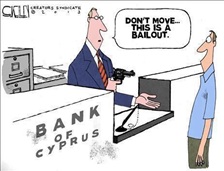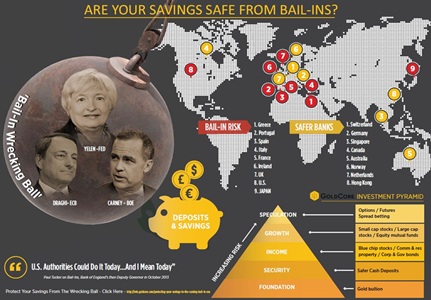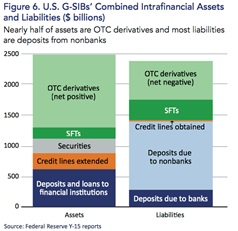Did You Know…Cash Is No longer King?
- “Money in the Bank” and “Cash is King” used to mean that cash was risk-free. This is no longer true - after successfully bailing-in Cyprus’ depositors in 2013, the G-20 have adopted bail-ins as the new bank resolution policy. To make sure derivatives will never again trigger public bailouts, all claims, including deposits, have been subordinated to the banks’ derivatives obligations to each other.

- In January, DYK wrote about the surprise action by the Swiss National Bank, which triggered sharp CHF revaluation. Last weekend, Heta, an Austrian “bad bank” formed after the failure and nationalization of the Hypo-Adria-Bank, has been revealed as the latest casualty of the SNB surprise.
- Now, stakeholders of Heta are about to get a taste of the EU’s Bank Recovery and Resolution Directive. “Austria on Sunday [3-1-15] said it is halting payments on more than €11 billion ($12.28 B) in debts until it has found a way of winding down the nationalized lender without more costs for taxpayers.” (WSJ)
- For anyone paying attention, the message is clear: Taxpayer-funded bailouts are dead. Long live the bail-ins!

- Closer to home, US Congress has been quietly undoing post-crisis bank reforms. Buried inside the latest budget deal, was a major rollback of the Dodd Frank law and the Volker Rule, which removed the prohibition on trading derivatives within FDIC-insured subsidiaries. Banks did not want to raise capital needed to meet rating agencies’ criteria and so they successfully lobbied Congress to let them again hide their derivative exposures behind the not-so-broad shoulders of the FDIC insurance.
- Unfortunately, FDIC coverage is a hollow promise. FDIC insures deposits up to $250,000 but its $50 billion loss reserve is mere 0.86% of the covered deposits. This may have been ok when the system was comprised of numerous small banks but not when top 5 banks control nearly 50% of all bank assets.

- Having to stand behind derivatives materially increases depositors’ risks because nearly half of the TBTF banks’ assets are OTC derivatives. Top four US banks hold well over $200T in derivatives, which is 12 times the size of the US GDP. JPM alone has over $70T in derivatives on its books! These are gross exposures but, as we saw in 2008, failure of any large counter-party can quickly turn gross into net.
- With sovereign finances already over-stretched, regulators have little choice but revert to the basics - when banks fail, their stakeholders lose money. However, prevailing reliance on “implicit” government guarantees ensures that the next crisis will be full of bitter disappointments. Perhaps this is why, speaking at The Hutchins Center on Fiscal and Monetary Policy on March 2, 2015, Ben Bernanke advocated giving the president war-time emergency powers for dealing with future economic crises. Here is someone who fully understands the issues and their implications.
Bottom Line:
- Epic derivative exposures, new bail-in laws and subordination rules are turning deposits into risk assets at a time when bank depositors either get no compensation or pay for the privilege of risking their cash.
- Uninsured deposits are fully exposed but so are the insured deposits - FDIC is grossly under-reserved and would need its own bailout if any large bank were to fail.
- Individuals and institutions have limited alternatives - today’s anti-money laundering and similar laws make storing and/or using larger cash sums outside a bank neither feasible nor safe.
- Fully-reserved non-bank gold bullion accounts can uniquely mitigate risk by offering liquidity, legal compliance and ability to transact value without exposure to the banks and financial counter-parties.
******
TOCQUEVILLE BULLION RESERVE (TBR) is a private vehicle that allows individuals and institutions to take full advantage of gold bullion’s universal liquidity and independence from financial systems and currencies. TBR structure offers safety and utility of liquid financial instruments and payment networks, without exposure to financial institutions and capital markets. Our unique full-service approach ensures security, compliance, transparency, daily liquidity and global deliverability of private bullion holdings.*






 John Hathaway, CFA, Senior Managing Director, Co-Portfolio Manager
John Hathaway, CFA, Senior Managing Director, Co-Portfolio Manager Simon A. Mikhailovich, Managing Director
Simon A. Mikhailovich, Managing Director









